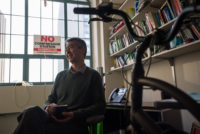Fifteen guest builders-in-residence are taking advantage of new workshop and design space in Boston’s Seaport Innovation District. The space is devoted to experiments in futuristic building technologies, materials and techniques.
The 34,000-sq-ft Build Space, which opened on Oct. 5, is a first-of-its-kind industrial workshop and innovation studio dedicated to construction processes and materials, according to the owner, Autodesk Inc. Carl Bass, president, calls it “a powerful place to influence the future of making things for the built world.”
Autodesk will benefit from the feedback it gains from “being in such close proximity to industry futurists,” he says.
Autodesk is hosting teams from academia, industry and practice working in digital fabrication, design robotics and industrialized construction. Space is provided at no cost, but prospective tenants “must have an interesting idea to address a problem in the industry or advance a new technique or process,” says an Autodesk spokesman.
The two-story space has more than 60 pieces of large-format equipment, including six industrial robots and a five-ton crane. It has 11 workshops for wood, metal, composites, 3D printing, and laser and waterjet cutting. A precisely controlled and monitored environmental test chamber lets researchers expose samples to various conditions.
Pillar Technologies, one of the first tenants, is using the space to design products with sensors to detect destructive environmental conditions, such as those that encourage mold. “Build Space allowed our team to create a next-generation product in a few weeks with minimal cost,” said Alex Schwarzkopf, co-founder. “This is so valuable because, as a start-up company, our scarcest resources are time and money.”
At the opening, Julian Leland, an MIT graduate student and lead researcher at the MIT Media Lab, displayed a two-armed robot, called a “micro-macro manipulator,” that his team is developing. He hopes it will be useful for construction tasks that require a reach beyond the 3-meter limit of industrial robots today. “It’s hard to work on a project of this scale anywhere at MIT. Space is so limited in Cambridge,” he says.
Tom Carrier, 3D fabrication coordinator at Boston-based Elkus Manfredi Architects, showed trial models for architectural ornaments he is crafting in high-density foam to prepare for modeling with 3D software. “This space gives us the opportunity to try different materials and work at different scales, not bound by any constraints,” he said.





Post a comment to this article
Report Abusive Comment